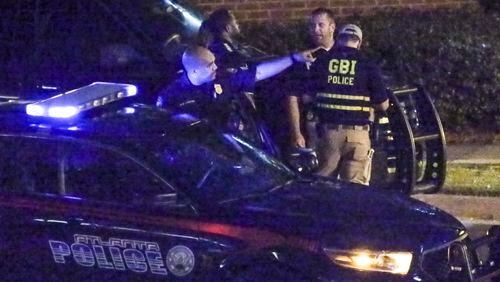As protests over police violence against black citizens swelled in recent years, the lack of reliable government data embarrassed law enforcement officials and made it seem like the profession didn't take the issue seriously.
Police track scores of statistics. So how could they not accurately say how often they killed someone in the line of duty? A new national pilot project to fix the problem launched in July and Georgia is one of 13 states participating. The project's goal is to gain an accurate measure of police use of force in all 50 states.
"It's going to be used to influence training, tactics and responses to situations," said GBI Director Vernon Keenan, who was part of a national group of law enforcement leaders who helped create the project. "It's going be very important."
But the program almost died before it ever got started, according to Keenan.
When President Trump took office in January, he ushered in a new law and order agenda with a new attorney general, Jeff Sessions, to oversee the Justice Department. In certain corners of the administration, the National Use-of-Force Data Collection Project was seen as another federal initiative thrust on state and local police.
It didn't help that the biggest champion at the federal level was then-FBI Director James Comey who fell out of favor with President Trump in the early days of the administration. The president famously fired Comey in May.
But long before Trump announced his bid for president, law enforcement leaders across the country were caught flatfooted by the new era of scrutiny ushered in by the police shooting death of black teenager Michael Brown in Ferguson, Mo., in August 2014.
For years, the data on police shootings collected by the FBI was woefully incomplete. Comey in 2015 said it was "embarrassing and ridiculous" that law enforcement couldn't provide national data on the number of people shot and killed by police and he said it was harming its relationship with minority communities. He called it "unacceptable" that news organizations were providing the most accurate information on the subject. (Here's the AJC database on fatal police shootings in Georgia since 2010.)
Comey vowed to fix the problem and a committee of local, state and federal law enforcement leaders was formed to develop a national collection program. They met for almost two years to develop the new data collection system that is intended to collect detailed information anytime an officer shoots and kills or seriously injures a person.
Keenan said when he and others in law enforcement associations across the country learned in the spring that the project had run into problems with the administration they appealed directly to Sessions.
They made clear that the national data collection system was something state and local police recognized as critical to measure police use of force and understand trends.
"What law enforcement is tired of is relying on the media for officer use of force data," Keenan said. "Having data that is accurate based on the case reports is imperative."
The appeals to Sessions by the Association of State Criminal Investigative Agencies, of which the GBI is a member, as well groups such as the International Association of Chiefs of Police, whose incoming president is LaGrange Police Chief Lou Dekmar, seemed to help.
Even after Comey's firing, the data collection project was revived and moved forward to the pilot launch in July. The FBI declined to comment about the project, but said 72 state and local law enforcement agencies across the country are participating as well as some federal agencies.
Keenan said during a recent conference call about the project that Georgia was identified as the state with the most participants. Currently, 19 agencies in Georgia have agreed to provide detailed data to the system when they have a serious shooting. The initial pilot project is expected to last six months.
Keenan said the program is voluntary, which raises the possibility that some police shootings will not be captured in the collection. GBI investigates almost all police shootings and will have the ability to input data from those case files as well.
"Everyone I call personally signs up immediately," Keenan said. "They know how important this is."
To read more about the AJC's investigation of police shootings and data collected go to myAJC.com.
About the Author







